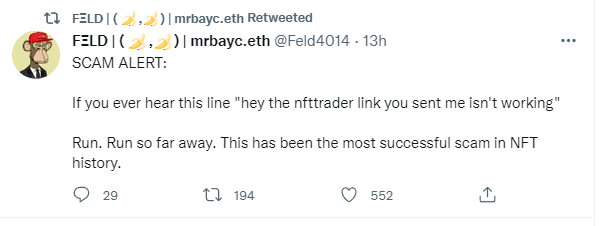Through a phishing scam, people have had NFTs stolen from their wallets through fake links to the popular platform, NFTtrader. Please note, NFTtrader is not a scam, but people are creating fake links in order to get NFTs for their own good instead of a genuine trade through the real platform.

NFTtrader Phishing Scam Successfully stole BAYC #8933
The biggest NFTtrader phishing scam we have seen so far involved Twitter user @shanterpster. Unfortunately, the unlucky chap fell victim to yet another dodgy link site. “Just got scammed”, he regretfully told twitter.
This NFT maxi lost a Bored Ape NFT, specifically a Sushi Ape (#8933) through the NFTtrader scam. To explain the gravity of his loss, the floor price at the time was 69.42 ETH, or $281,000. Opensea did report the Ape for suspicious activity. However, the scammer managed to quickly offload the Ape onto an unsuspecting investor.
What is Phishing and what is it to do with NFTs?
Phishing is defined by Oxford Dictionary as “the fraudulent practice of sending emails purporting to be from reputable companies in order to induce individuals to reveal personal information, such as passwords and credit card numbers.” In the case of NFTs, the fake website links allow the scammer access to your crypto wallet or NFT collection. Usually, they will make you sign a real transaction in your wallet, and then steal your NFTs or drain your funds. Sometimes, the scam will do both. Alternatively, they will direct you to a fake wallet pop-up which will prompt you to enter your seed phrase or private keys. That gives them access to your whole wallet!
How To Avoid The NFTtrader Phishing Scam
The biggest alarm bell should be if someone tells you “the NFTtrader link you sent me isn’t working”. What the scammer is trying to do is confuse you into clicking their link instead. Yes, as one twitter user noted below, this is an incredibly successful scam.

The main way to avoid this sounds obvious. However, holders of huge collections often don’t listen. Firstly, make sure to check the website links you’re clicking on. In this case, make sure that you are on the correct NFTtrader website! Then, do not share your seed phrase with anyone. Finally, consider using a hard wallet (like Ledger) to store your NFTs!
Where is shanterpster now?
Thankfully, they took it well in the first place, saying “I’m thankful for everything God brings into my life both blessings and lessons”. Unfortunately, he proceeded to be scammed again just a few months later. Believe it or not, he lost another Ape to a completely different scam. On the plus side, the current owner of BAYC #8933 reached out to shanterpster. Firstly, to share some of the APEcoin he recieved, but now they are friends too (apparently). Plus, he still has a MAYC. Although at this rate, for how long?
All investment/financial opinions expressed by NFTevening.com are not recommendations.
This article is educational material.
As always, make your own research prior to making any kind of investment.








